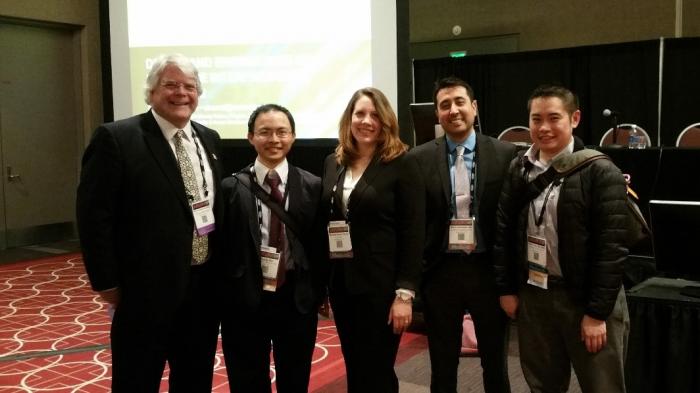Grantees Focusing on Hispanic and Latino Populations

“I have found it fascinating to see the way that almost all patients speak differently, using simpler phrases and less words, when using an interpreter. Their descriptions of clinical symptoms and histories is much richer and more useful from a psychiatric perspective when they are fully interviewed in their own language, with the translation occurring separately rather than as part of the conversation.” — Peter Yellowlees, M.D., University of California at Davis
Project Title: A Clinical Trial To Validate an Automated Online Language Interpreting Tool With Hispanic Patients Who Have Limited English proficiency
Summary: There is a pressing national need to provide higher quality, more effectively accessible language interpretation services to improve the health outcomes of the 4.7 percent of the U.S. population who have limited English proficiency. Due to language issues, these people have increased rates of hospital admissions, misdiagnosis, improper treatment, and poorer health comprehension and outcomes. We have built an automated language translation tool to allow clinical evaluations of recorded interviews to occur across languages without the use of human interpreters and are evaluating the accuracy of the tool and the preferences of Spanish-speaking patients for clinical interviews using either the tool or professional interpreters.


“Latino dual-language learners from low-income backgrounds face large gaps in school readiness, which perpetuate existing inequities in well-being. Pediatric clinicians have a unique opportunity to promote school readiness given their near universal, frequent contact with young children and established relationships with parents. Funding from AHRQ provides an opportunity to generate actionable knowledge on how pediatric clinicians can make the most of this opportunity to promote optimal developmental health for Latino children.” — Manuel Jimenez, M.D., Rutgers Robert Wood Johnson Medical School
Project Title: Ready and Healthy for Kindergarten: A Primary Care Innovation To Promote a 360-Degree View of Child Health
Summary: This study refines and tests an online family wellness program designed for low-income Latino dual- language learners entering kindergarten and their families. The program builds on families' strengths and uses health topics such as physical activity and nutrition to introduce basic language and literacy skills in English and Spanish while promoting healthy routines.

“There is great promise in the use of digital therapeutics to mitigate access inequities in behavioral sleep medicine, particularly for linguistic minorities such as Spanish-speaking Latinx adults. I am delighted to lead this multistakeholder and multidisciplinary partnership that has as an express focus the social determinants of health and digital health equity.” — Carmela Alcantara, Ph.D., Columbia University New York Morningside
Project Title: Using eHealth To Expand Access to Cognitive Behavioral Therapy for Insomnia in Hispanic Primary Care Patients
Summary: This project aims to increase access to the recommended first-line treatment of insomnia, cognitive behavioral therapy for insomnia (CBT-I), for Spanish-speaking Hispanic/Latinx primary care patients. The Dormir Mejor study uses a hybrid trial type 1 effectiveness-implementation study design and a mixed-methods approach that leverages recent advances in digital therapeutics to (1) enroll 200 Spanish-speaking Hispanic/Latinx primary care patients with chronic insomnia into a randomized controlled trial that compares the effectiveness of a culturally adapted digital CBT-I with enhanced usual care on reduction of insomnia symptoms; (2) concurrently assess the organizational, patient, and provider barriers to implementation, and (3) determine the cost-effectiveness of the intervention. By leveraging advances in digital therapeutics, this project aims to address the supply and demand imbalance that perpetuates inequities in mental health care access in behavioral sleep medicine.



